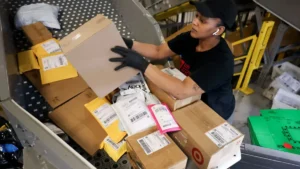In 2025, the demand for medical courier services continues to rise as hospitals, pharmacies, laboratories, and home healthcare providers depend on fast and secure delivery of critical items like lab specimens, medications, surgical equipment, and medical records. But one of the most common questions is: How much does a medical courier service cost in 2025?
What is Medical Courier?
A medical courier is a trained delivery professional who transports delicate items and materials used in healthcare, such as lab samples, blood samples, patient medical records, surgical instruments and equipment, and prescription drugs. Medical couriers differ from ordinary couriers by being trained to transport confidential, time-sensitive, temperature-sensitive materials that affect patients accordingly.
Why Cost Matters in Medical Courier Services
Medical delivery has different standards than typical courier services today. It’s not the same as delivering clothes or gadgets. Medical deliveries contain time-sensitive, temperature-controlled, and legally managed pieces of the delivery supply chain.
Choosing the cheapest option without considering compliance and reliability can risk:
- Delayed lab results
- Broken chain of custody for legal specimens
- Damaged or spoiled medical supplies
- Violations of HIPAA or healthcare regulations
This is why pricing is structured differently from regular courier services.
Average Cost of Medical Courier Services in 2025
While exact rates vary by region, here’s a breakdown of the average cost ranges you can expect in 2025:
- Local Same-Day Delivery: $35 – $80 per trip (short distances within a city)
- Long-Distance Deliveries: $1.50 – $3.50 per mile depending on urgency
- Stat / Rush Deliveries (emergency, under 2 hours): $75 – $200+ per trip
- Scheduled Routes (daily/weekly contracts): $500 – $3,000+ per month depending on frequency and mileage
- Special Handling (temperature-controlled, hazardous, or large equipment): Additional $20 – $100 per delivery
Factors That Influence Medical Courier Pricing
1. Distance & Delivery Zones
- Local urban deliveries cost less than long-distance intercity transport.
- Couriers often charge per mile (or per km internationally).
2. Urgency of Service
- Stat / rush deliveries cost the most.
- Scheduled, recurring routes are cheaper due to predictability.
3. Type of Medical Item
- Specimens & samples → require temperature stability.
- Medications → may need locked containers.
- Medical devices → bulky items require special vans.
4. Compliance & Certification
Reputable providers have HIPAA-trained staff, background checks, and chain-of-custody tracking. These standards increase costs but ensure safety.
5. Technology & Tracking
- GPS tracking, barcode scanning, and electronic signatures improve transparency.
- Couriers that offer 24/7 digital tracking usually charge a premium.
6. Frequency of Use
- One-time deliveries are more expensive.
- Contracts or bulk scheduling reduce per-trip costs significantly.
Cost Comparison: One-Time vs. Contract Services
| Type of Service | Average Cost (2025) | Best For |
| One-Time Local Trip | $40 – $90 | Small clinics, occasional use |
| Urgent / Stat Delivery | $75 – $200+ | Emergency hospitals, labs |
| Scheduled Routes | $500 – $3,000+/mo | Large hospitals, pharmacies |
| Specialty Delivery | $20 – $100 extra | Biotech firms, labs, research centers |
If your organization has daily or weekly needs, contracts save 20–40% compared to one-off requests.
Balancing Cost with Reliability
It’s tempting to pick the cheapest provider, but medical delivery failures can be catastrophic. Always balance price with:
- Compliance with healthcare regulations
- Insurance coverage for medical items
- Trained drivers in specimen handling
- Temperature-controlled fleet availability
The Future of Medical Courier Costs
In 2025 and beyond, prices may shift due to:
- Rising fuel costs → impacting per-mile rates
- AI and automation → lowering operational costs in routing & tracking
- Drone and autonomous deliveries → expected to reduce same-day costs for small items within cities
- Stricter compliance laws → may increase costs for non-compliant couriers
Final Thoughts
In 2025, the expense of using medical courier services will depend on how urgent the delivery is, the distance traveled, and what type of medical item is being delivered. Medical courier costs will usually fall within the range of $40 – $200 per trip, or $500+ per month with a contract. Cost is always a consideration but healthcare providers should prioritize reliability, compliance, and safety over simply the cheapest service available. In an area of health care where lives depend on getting it delivered in a timely manner, paying a few extra dollars could be key.
Frequently Asked Questions (FAQs) About Medical Couriers
What is a medical courier?
A medical courier delivers healthcare items including laboratory specimens, blood samples, prescription medications, and medical records. Their responsibility is to deliver safely, on time, and in accordance with regulations between hospitals, clinics, labs, and pharmacies.
How is a medical courier different than a regular courier?
Medical couriers differ from regular couriers because they have training in receiving and delivering time sensitive, regulated goods. Medical couriers maintain compliance with healthcare standards, including HIPAA, package healthcare items in specialized packaging, and provide delivery with a chain of custody.
What are the qualifications for medical couriers?
Typically, providers will require a valid driver’s license and background checks for medical couriers. As it pertains to training, HIPAA training is common, and then in some cases, medical couriers must also demonstrate knowledge of specimen handling and refrigeration protocols. Reliability and detail are extremely important.
How much does a medical courier service cost?
Prices vary by distance, urgency, and type of delivery. Based on an average in 2025, local economy courier deliveries average $40-$90, taking into account “rush” must arrive right away, can exceed a price of $150, a hospital or lab requiring contract pick-up and drop-off will pay between $500-$3,000+.








